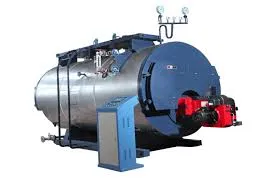
Oct . 18, 2024 09:08 Back to list
Boiler Operations and Hot Oil Heating Systems Overview
Understanding Boiler Hot Oil Systems
In industrial and commercial settings, the need for efficient heating solutions is paramount, especially in processes that require precise temperature control. One such system is the boiler hot oil system, which provides an effective method for transferring heat for various applications. This article will delve into how hot oil boilers operate, their advantages, applications, and maintenance considerations.
What is a Boiler Hot Oil System?
A boiler hot oil system utilizes thermal oil as a heat transfer medium instead of water or steam
. These systems are designed to heat fluids to high temperatures, which can be particularly useful in processes that require a stable thermal medium without the risk of pressure buildup associated with steam systems. Thermal oils can be safely heated to temperatures often exceeding 300 degrees Celsius (572 degrees Fahrenheit), providing an efficient means of transferring heat across various industrial applications.Operating Principles
The fundamental operation of a hot oil boiler comprises three main components the burner, the heat exchanger, and the thermal oil itself. The burner heats the thermal oil within the boiler, which then circulates through a network of pipes leading to the heat exchanger. In the heat exchanger, the thermal oil transfers its heat to the working fluid or the environment without any phase change, maintaining a continuous and efficient heating cycle.
One of the notable aspects of hot oil systems is their ability to function at atmospheric pressure, significantly reducing the risks associated with high-pressure steam systems. This characteristic makes them a safer option for many processes, reducing the potential for accidents and system failures.
Advantages of Hot Oil Systems
1. High Efficiency Hot oil systems are known for their efficiency in heat transfer. High thermal conductivity of the oils, combined with the ability to operate at high temperatures, means less energy is lost during heating processes compared to traditional systems.
2. Versatile Applications These systems are incredibly versatile and can be used across various industries, including chemical processing, food production, rubber manufacturing, and oil refining. The high operating temperature makes them suitable for applications like drying, heating, and processing materials that require precise thermal management.
boiler hot oil

3. Stable Temperature Control The ability of hot oil systems to maintain consistent temperatures is crucial during industrial processes. This stability ensures product quality and enhances operational efficiency.
4. Reduced Maintenance Needs Unlike steam boilers that may corrode or require frequent maintenance due to the build-up of scale and other deposits, hot oil systems are typically easier to maintain, resulting in lower downtime and operational costs.
Applications of Boiler Hot Oil
The flexibility of hot oil boilers allows them to be used in numerous applications. In the chemical industry, for example, they are often employed for the synthesis of materials requiring specific temperature profiles. In the food industry, hot oil systems are favored for their ability to maintain the required temperatures for frying, curing, baking, and drying processes without compromising food safety.
In rubber and plastic production, precise temperature control is also vital, and hot oil systems provide the necessary thermal stability for molding and curing processes. Furthermore, in the oil and gas sector, hot oil units can be deployed for heating crude oil to lower its viscosity, facilitating easier pumping and processing.
Maintenance and Considerations
While hot oil systems are generally easier to maintain, regular checks and maintenance practices are still essential to ensure optimal performance. Operators should regularly inspect the thermal oil for contaminants and degradation, as the physical properties of the oil can change over time, influencing efficiency. Oil sampling and testing should be a part of a routine maintenance schedule.
Operators should also monitor temperature and pressure gauges to detect any abnormalities that could signal potential issues. Implementing a preventative maintenance program can significantly extend the life of the hot oil system and help avoid costly downtime.
Conclusion
Boiler hot oil systems represent a reliable, efficient, and safe method for heating fluids in various industrial applications. With their high efficiency, versatility, and stable temperature control, they are integral to many processes, ensuring that industries can maintain quality while optimizing operational costs. Understanding their operation, advantages, and maintenance is crucial for anyone involved in managing industrial heating solutions. As industries continue to evolve, hot oil systems will undoubtedly remain a preferred choice for many heating applications.
-
Oil Fired Hot Water Boilers Sale - High Efficiency & Affordable
NewsJul.31,2025
-
High-Efficiency Commercial Oil Fired Steam Boiler for Industry
NewsJul.30,2025
-
High-Efficiency Biomass Fired Thermal Oil Boiler Solutions
NewsJul.30,2025
-
High Efficiency Gas Fired Thermal Oil Boiler for Industrial Heating
NewsJul.29,2025
-
High-Efficiency Gas Fired Hot Water Boiler for Sale – Reliable & Affordable
NewsJul.29,2025
-
High Efficiency Biomass Fired Hot Water Boiler for Industrial and Commercial Use
NewsJul.29,2025
Related PRODUCTS






















